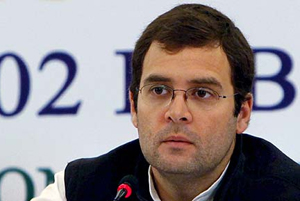 New Delhi, Jan 29: Hitting out a Rahul Gandhi, the Bharatiya Janata Party on Tuesday said that the Congress vice president lied in his comments on the Gujarat riots.
New Delhi, Jan 29: Hitting out a Rahul Gandhi, the Bharatiya Janata Party on Tuesday said that the Congress vice president lied in his comments on the Gujarat riots.
Rahul, in an interview to a TV news channel, had claimed that the difference between the 1984 riots and the 2002 riots in Gujarat was that in 1984 the government was trying to stop the violence, while in Gujarat the government was "abetting and pushing" the riots.
Taking on Rahul, the BJP on Tuesday said the Congress vice president was "bereft of an idea which could generate hope".
The Congress, as per IANS, however, defended Rahul, saying that transfer of Gujarat riot cases outside the state was a vote of no-confidence on the Narendra Modi government.
Bharatiya Janata Party leader Ravi Shankar Prasad said Rahul's interview with a news channel was "a performance of evasion, which was amateurish, rank falsehood and unfortunately of rank ignorance".
Leader of Opposition in the Rajya Sabha Arun Jaitley also slammed Rahul's remarks, saying he was ill-informed about the 1984 anti-Sikh riots.
"Rahul Gandhi is ill-informed. In 1984, police hardly fired at the rioters... it was in collusion with the government. In Gujarat, 300 rioters died in police firing. Around 65,000 rioters were arrested in Gujarat... more than 4,000 cases have been chargesheeted and hundreds have been convicted," Jaitley said.
"Even the chief minister (of Gujarat) has gone through inquiries. What did they (Congress) do in 1984?" Jaitley questioned.
"Which Congressman has ended up in jail because of 1984? The call for 'khoon ka badla khoon' (an eye for an eye) was heard in AIIMS (All India Institute of Medical Sciences) first," he said.
Then prime minister Indira Gandhi was taken to the AIIMS after being sprayed with bullets by her Sikh bodyguards.
On Rahul Gandhi not apologising for the 1984 riots, Jaitley said: "We are not expecting him to go that far. We are just expecting him to have correct lessons of history."
Prasad told media persons that Gandhi could do little to check price rise, tackle corruption or boost manufacturing and economy during the 10 years of the United Progressive Alliance government, in which he was the "second-most decisive voice" after his mother, Congress president Sonia Gandhi.
He said Rahul Gandhi's remark about the Gujarat riots was a "textbook case of speaking a lie".
Prasad said former prime minister Rajiv Gandhi said in 1985 that "the Earth shakes when a big tree falls".
"This was an attempt to justify 1984 (riots)," Prasad said.
Stating that Gandhi's remarks about dynastic politics were "ridiculous", Prasad said: "The very rationale of your (Rahul Gandhi's) authority is dynasty."
Referring to Modi, Prasad said it can only happen in the BJP that a person born in a poor family is made prime ministerial candidate "on the basis of his capacity, talent and record of governance".
Congress spokesperson Abhishek Manu Singhvi said even harshest critics of Rahul Gandhi agree about his sincerity, passion and commitment to change.
He said Prime Minister Manmohan Singh had apologised for the 1984 riots. Singhvi said the 2002 riot cases had to be transferred out of Gujarat and there has been no apology.
Bihar Chief Minister Nitish Kumar said in Patna that the Congress was responsible for the 1984 anti-Sikh riots in Delhi and the 1989 communal clashes in Bhagalpur, while the BJP was responsible for the 2002 Gujarat communal flare-up.
HS Phoolka, an advocate who has fought cases of the 1984 riot victims, said Gandhi's remarks were "like salt on the wounds of the victims".
He said that in case of Gujarat riots, all those cases which were closed by the police were reopened and reinvestigated by the special investigation team (SIT) while this was not done in case of the 1984 riots.
"It is thus absolutely imperative to form an SIT to reopen and reinvestigate these cases but unfortunately the Congress is not interested in formation of an SIT," Phoolka said in a release.
Shiromani Akali Dal leaders slammed Gandhi over his remarks, saying he had not expressed apology for the riots.





Comments
Add new comment